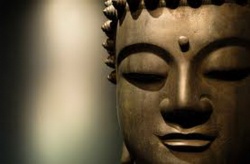Difference between revisions of "World of Buddhahood"
m (Text replace - "direct" to "direct") |
|||
| Line 4: | Line 4: | ||
[仏界] (Jpn bukkai ) | [仏界] (Jpn bukkai ) | ||
| − | Also, [[realm]] of [[Buddhas]]. The highest of the Ten [[Worlds]]. When viewed as a state of [[life]], the [[world]] of [[Buddhahood]] is a [[condition]] of [[absolute]] [[happiness]], attained upon gaining the [[wisdom]] to realize the [[ultimate reality]] of one's own [[life]] and the [[compassion]] to | + | Also, [[realm]] of [[Buddhas]]. The highest of the Ten [[Worlds]]. When viewed as a state of [[life]], the [[world]] of [[Buddhahood]] is a [[condition]] of [[absolute]] [[happiness]], attained upon gaining the [[wisdom]] to realize the [[ultimate reality]] of one's own [[life]] and the [[compassion]] to direct one's activities constantly toward benevolent goals. A [[person]] in this state has access to [[boundless]] [[wisdom]] and [[compassion]], as well as the {{Wiki|courage}} and [[power]] to overcome any obstacle. In [[Mahayana Buddhism]], acquiring this state of [[life]] is the goal of [[Buddhist practice]]. In teachings based on the [[Lotus Sutra]], in particular, the [[realm]] of [[Buddhahood]] is not viewed as a [[realm]] apart from the nine [[worlds]], or from the [[desires]] and [[sufferings]] of [[life]] in the real [[world]]. In this [[sense]], it is different from the [[Hinayana]] [[view]] of [[nirvana]], which is a complete [[annihilation]] of [[desire]] and [[suffering]] that can only be achieved fully upon [[annihilation]] of the [[physical body]]. Rather, in the [[world]] of [[Buddhahood]], one is able to keep constantly in check life's innate "[[fundamental darkness]]," the source of destructive impulses and [[delusion]], and [[function]] based on an inexhaustible supply of [[supreme wisdom]]. In [[The Object]] of Devotion for Observing the [[Mind]], [[Nichiren]] states: "That [[ordinary people]] born in the latter age can believe in the [[Lotus Sutra]] is due to the fact that the [[world]] of [[Buddhahood]] is present in the [[human world]]" (358). |
</poem> | </poem> | ||
{{R}} | {{R}} | ||
Latest revision as of 12:32, 8 September 2013
world of Buddhahood
[仏界] (Jpn bukkai )
Also, realm of Buddhas. The highest of the Ten Worlds. When viewed as a state of life, the world of Buddhahood is a condition of absolute happiness, attained upon gaining the wisdom to realize the ultimate reality of one's own life and the compassion to direct one's activities constantly toward benevolent goals. A person in this state has access to boundless wisdom and compassion, as well as the courage and power to overcome any obstacle. In Mahayana Buddhism, acquiring this state of life is the goal of Buddhist practice. In teachings based on the Lotus Sutra, in particular, the realm of Buddhahood is not viewed as a realm apart from the nine worlds, or from the desires and sufferings of life in the real world. In this sense, it is different from the Hinayana view of nirvana, which is a complete annihilation of desire and suffering that can only be achieved fully upon annihilation of the physical body. Rather, in the world of Buddhahood, one is able to keep constantly in check life's innate "fundamental darkness," the source of destructive impulses and delusion, and function based on an inexhaustible supply of supreme wisdom. In The Object of Devotion for Observing the Mind, Nichiren states: "That ordinary people born in the latter age can believe in the Lotus Sutra is due to the fact that the world of Buddhahood is present in the human world" (358).
